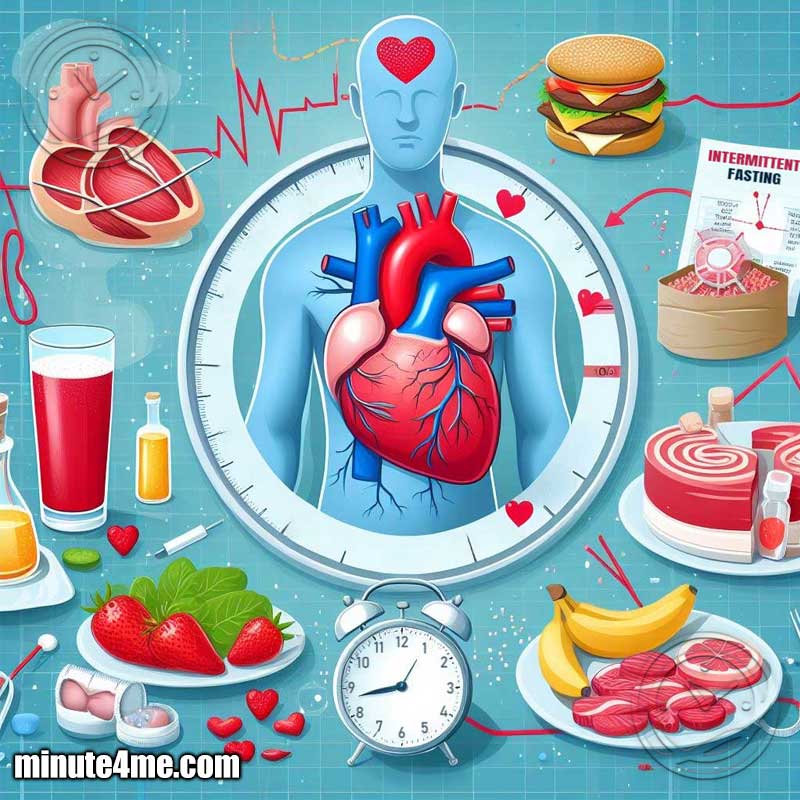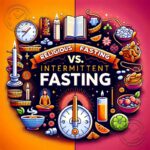Introduction
Intermittent fasting (IF) is not just a dietary trend but a lifestyle choice gaining traction for its profound health implications.
Central to IF’s appeal is its flexibility and adaptability to various lifestyles, preferences, and health goals.
Unlike traditional diets that prescribe meticulous calorie counting or restrictive food lists, IF emphasizes the timing of meals, cycling between periods of fasting and eating.
This approach has been associated with numerous health benefits, from weight management to improved metabolic health, making it a subject of considerable interest in the nutritional and medical communities.
The most common intermittent fasting methods include:
- 16/8 Method: Restricting daily eating to an 8-hour window, followed by 16 hours of fasting.
- 5:2 Diet: Consuming normal calorie intake for 5 days of the week and significantly reducing calorie intake on the other 2 days.
- Eat-Stop-Eat: Engaging in a 24-hour fast once or twice a week.
- Alternate-Day Fasting: Alternating between days of normal eating and days of no or minimal calorie intake.
Each method offers unique benefits and challenges, allowing individuals to select the approach that best fits their lifestyle, health status, and goals.
Intermittent Fasting and Cardiovascular Health Explained
Intermittent fasting’s impact on cardiovascular health is both direct and indirect, influencing various risk factors associated with heart disease.
By modulating the body’s metabolic pathways, IF helps in managing weight, blood pressure, cholesterol levels, and insulin sensitivity.
The benefits are attributed to physiological changes during fasting, such as improved fat metabolism and reduced inflammation, which are crucial for maintaining heart health.
The relationship between IF and cardiovascular health involves several key aspects:
- Autophagy: This cellular “cleanup” process removes damaged cells and contributes to reduced oxidative stress and inflammation, protecting against cardiovascular disease.
- Insulin Sensitivity: Improved insulin sensitivity helps in managing blood sugar levels, reducing the risk of metabolic syndrome, a major cardiovascular risk factor.
- Lipid Profile: Fasting can alter lipid metabolism, leading to decreased LDL cholesterol and triglycerides, which are critical in preventing heart disease.
Religious vs. Intermittent Fasting: Differences and Synergies
Discover the fascinating world of fasting, where ancient traditions meet modern health trends. Delve into the diverse practices of religious…
The Science Behind Fasting and Heart Health
Emerging studies underscore the potential of IF in bolstering heart health.
Research findings suggest that intermittent fasting may confer cardiovascular benefits through several mechanisms:
| Mechanism | Effect on Heart Health |
|---|---|
| Weight Management | Reduces cardiac workload and improves heart function |
| Blood Pressure Reduction | Lowers the risk of hypertension and vascular damage |
| Improved Lipid Profile | Decreases LDL cholesterol and triglycerides |
| Enhanced Insulin Sensitivity | Lowers risk of type 2 diabetes, a risk factor for heart disease |
These effects are attributed to the body’s adaptive response to the fasting state, which includes shifts in metabolic pathways, hormonal adjustments, and cellular repair processes.
Weighing Benefits: Heart Health and IF
The benefits of intermittent fasting on the heart are multifaceted and include:
- Weight Loss: Significant weight loss reduces the strain on the cardiovascular system, decreasing the risk of heart disease.
- Blood Sugar Control: Improved glycemic control through enhanced insulin sensitivity directly impacts heart health.
- Inflammation Reduction: Lower levels of inflammation protect against the development of atherosclerosis and other forms of cardiovascular disease.
- Blood Pressure and Cholesterol Improvement: Modulating these crucial markers lowers the risk of stroke and heart attack.
Benefits of IF on Cardiovascular Health:
- Weight Loss: Promotes a healthy body weight.
- Insulin Sensitivity: Prevents type 2 diabetes.
- Inflammation: Reduces markers of inflammation.
- Blood Pressure: Lowers hypertension risk.
- Cholesterol Levels: Improves lipid profiles.
The Danish diet has been linked to a number of health benefits, including a reduced risk of heart disease, stroke,…
Potential Risks and Considerations
While intermittent fasting offers promising benefits, it’s not devoid of risks or side effects.
Potential challenges include:
- Nutrient Deficiencies: Limited eating windows can result in inadequate intake of essential vitamins and minerals.
- Eating Disorders: IF may trigger unhealthy eating behaviors, particularly in individuals with a history of disordered eating.
- Adverse Effects: Initial phases of fasting often bring hunger, headaches, and irritability as the body adjusts.
Risks and Considerations of IF:
- Nutrient Intake: Risk of deficiencies in vitamins and minerals.
- Eating Patterns: Potential to exacerbate or trigger eating disorders.
- Adaptation Period: Experience of hunger, fatigue, and mood changes.
Nutritional Balance and Heart Safety
To mitigate the risks associated with intermittent fasting, particularly in the context of heart health, attention must be paid to nutritional balance:
- Diverse Diet: Incorporating a wide range of nutrient-dense foods ensures adequate intake of all essential nutrients.
- Quality Over Quantity: Focusing on the quality of food during eating periods can help in meeting nutritional needs without overconsumption.
Danish Diet for Diabetes Control
Discover the Danish Diet, a powerful ally in managing diabetes and promoting overall health. Based on the wholesome traditions of…
Personalizing Intermittent Fasting
Intermittent fasting is not a one-size-fits-all solution. Factors to consider when personalizing an IF plan include:
- Health Status: Individuals with pre-existing conditions, such as diabetes or heart disease, need tailored advice.
- Lifestyle and Preferences: Choosing a fasting method that aligns with one’s routine and food preferences is crucial for long-term adherence.
- Goals: The choice of fasting protocol should reflect personal health and wellness goals.
Key Considerations for Personalizing IF:
- Medical Conditions: Tailor fasting based on health needs.
- Lifestyle Compatibility: Ensure the fasting method fits daily routines.
- Individual Goals: Align fasting with personal health objectives.
Implementing Intermittent Fasting Safely
Adopting intermittent fasting into your lifestyle warrants a careful, informed approach to maximize health benefits while minimizing potential risks.
Safety and sustainability are paramount, requiring a balanced diet, adequate hydration, and a sensible fasting schedule that aligns with individual health needs and daily routines.
Practical Tips for Starting IF
To embark on intermittent fasting safely and effectively, consider the following strategies:
- Begin Gradually: Start with shorter fasting periods and slowly extend the fasting window over time to allow your body to adjust.
- Stay Hydrated: Increase your intake of non-caloric fluids during fasting periods to maintain hydration.
- Mindful Eating: Focus on nutrient-dense foods during eating windows to ensure a balanced intake of vitamins, minerals, and other nutrients.
- Monitor Your Response: Pay close attention to how your body reacts to fasting, adjusting as necessary to address any discomfort or adverse effects.
Starting IF: A Step-by-Step Approach:
- Choose Your Method: Select an IF schedule that seems manageable based on your current lifestyle and health goals.
- Plan Your Meals: Organize what and when you will eat during your feeding windows to prevent impulsive, unhealthy eating choices.
- Ease Into Fasting: Begin with more manageable fasting intervals, gradually increasing the duration as your body adapts.
Balancing Diet and Fasting Cycles
A well-balanced diet is crucial for sustaining health and maximizing the benefits of intermittent fasting.
The following guidelines can help ensure nutritional adequacy:
- Diversity in Food Selection: Include a wide variety of fruits, vegetables, lean proteins, whole grains, and healthy fats in your diet.
- Protein and Fiber: Focus on high-protein and high-fiber foods during eating periods to enhance satiety and support muscle health.
- Plan for Nutrient Density: Aim to get the most nutritional value out of each meal, prioritizing foods rich in essential nutrients.
Nutritional Strategies During IF:
- Macronutrient Balance: Ensure a good balance of carbohydrates, proteins, and fats.
- Micronutrient Awareness: Pay special attention to vitamins and minerals that might be at risk of deficiency, such as iron, calcium, and vitamin D.
- Hydration: Beyond water, consider hydrating foods and electrolyte-rich beverages to maintain electrolyte balance.
Beyond Fasting: A Holistic Approach
Achieving optimal health extends beyond intermittent fasting alone; it encompasses a comprehensive approach that includes regular physical activity, stress management, and sufficient sleep.
Integrating Exercise with Fasting
Exercise is a cornerstone of cardiovascular health and can complement the benefits of intermittent fasting.
However, timing and type of exercise can be crucial for maximizing benefits and minimizing discomfort or risk of injury.
- Exercise Timing: Light to moderate exercise can be beneficial during fasting periods, but intense workouts may be best performed during feeding windows for energy and recovery.
- Type of Exercise: A mix of cardiovascular exercises, strength training, and flexibility workouts can support overall health and complement the effects of IF.
Exercise Recommendations During IF:
- Cardiovascular Exercises: Walking, cycling, or swimming to improve heart health.
- Strength Training: To maintain muscle mass and metabolic rate.
- Flexibility and Balance: Yoga or Pilates to enhance core strength and reduce stress.
Monitoring Health and Progress
Regular monitoring of health indicators and personal progress can help tailor the intermittent fasting approach for optimal benefits and safety.
- Track Biomarkers: Regularly check blood pressure, cholesterol levels, blood sugar, and body composition to assess the impact of IF on your health.
- Adjust Based on Feedback: Use health and wellness data to make informed adjustments to your fasting schedule, diet, and exercise routines.
Health Indicators to Monitor:
- Blood Pressure: Aim for a healthy range to reduce cardiovascular risk.
- Cholesterol Levels: Monitor LDL and HDL cholesterol, along with triglycerides.
- Blood Sugar: Keep an eye on fasting glucose and HbA1c levels, especially if diabetic or prediabetic.
- Body Composition: Track changes in body fat and muscle mass to ensure healthy weight management.
Conclusion
Intermittent fasting offers a promising pathway to improved cardiovascular health, offering benefits such as weight loss, improved blood sugar control, reduced inflammation, and better lipid profiles.
However, its implementation should be personalized, balanced, and integrated within a holistic approach to health that includes mindful eating, regular physical activity, and ongoing health monitoring.
With careful planning and consideration of individual health needs, intermittent fasting can be a valuable component of a heart-healthy lifestyle.
Resources:






